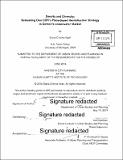| dc.contributor.advisor | Karl Seidman. | en_US |
| dc.contributor.author | Searl, Diana Cristina | en_US |
| dc.contributor.other | Massachusetts Institute of Technology. Department of Urban Studies and Planning. | en_US |
| dc.coverage.spatial | n-us-mi | en_US |
| dc.date.accessioned | 2016-10-25T19:51:22Z | |
| dc.date.available | 2016-10-25T19:51:22Z | |
| dc.date.copyright | 2016 | en_US |
| dc.date.issued | 2016 | en_US |
| dc.identifier.uri | http://hdl.handle.net/1721.1/105049 | |
| dc.description | Thesis: M.C.P., Massachusetts Institute of Technology, Department of Urban Studies and Planning, 2016. | en_US |
| dc.description | Cataloged from PDF version of thesis. | en_US |
| dc.description | Includes bibliographical references. | en_US |
| dc.description.abstract | This client-based thesis provides a review of three Detroit-based loan funds with the aim of understanding what developers have been able to access financing for multifamily and mixed-use developments in select neighborhoods. Though a great American city, Detroit has faced a declining population and dwindling economic base that has resulted in an upside down development market. Projects require complex capital stacks and high levels of subsidies, as rents alone cannot support development costs. The client, a national CDFI with expertise in health care, education, and senior-living facilities financing, was invited to Detroit to support a private sector and philanthropic initiative to re-densify strong neighborhoods with amenity-rich, market rate housing. Through a series of interviews and surveys with developers, fund investors and partner organizations, as well as a review of projects financed, this research determined that the majority of Detroit developers were high net worth individuals with significant experience in the market and that the majority of funds concentrated in the Midtown neighborhood. While this finding is not surprising, it does serve as a counterpoint to the CDFI's other goals of building local and minority developer capacity and expanding into new neighborhoods. The report highlights challenges noted by newer developers and provides recommendations for how this CDFI can support strong deals while fulfilling mission drive goals around inclusivity and affordability. | en_US |
| dc.description.statementofresponsibility | by Diana Cristina Searl. | en_US |
| dc.format.extent | 48 pages | en_US |
| dc.language.iso | eng | en_US |
| dc.publisher | Massachusetts Institute of Technology | en_US |
| dc.rights | M.I.T. theses are protected by copyright. They may be viewed from this source for any purpose, but reproduction or distribution in any format is prohibited without written permission. See provided URL for inquiries about permission. | en_US |
| dc.rights.uri | http://dspace.mit.edu/handle/1721.1/7582 | en_US |
| dc.subject | Urban Studies and Planning. | en_US |
| dc.title | Density and diversity : evaluating one CDFI's place-based revitalization strategy in Detroit's underwater market | en_US |
| dc.title.alternative | Evaluating one community development financial institutions place-based revitalization strategy in Detroit's underwater market | en_US |
| dc.type | Thesis | en_US |
| dc.description.degree | M.C.P. | en_US |
| dc.contributor.department | Massachusetts Institute of Technology. Department of Urban Studies and Planning | |
| dc.identifier.oclc | 959712893 | en_US |
